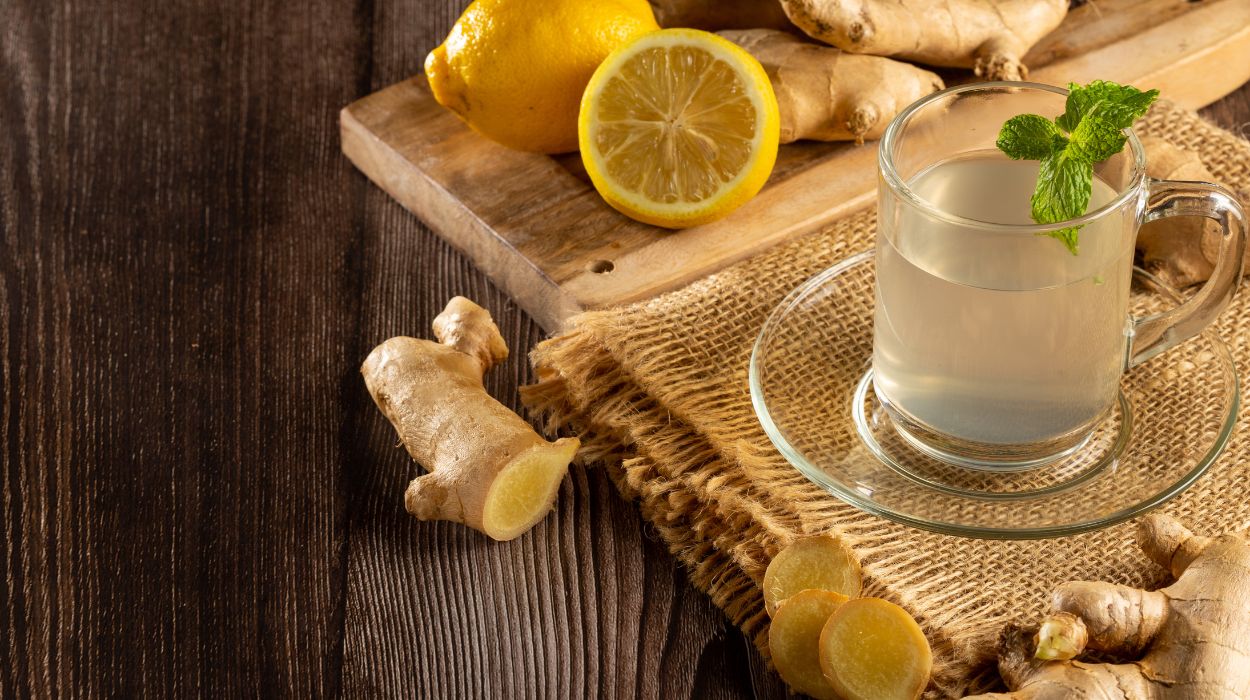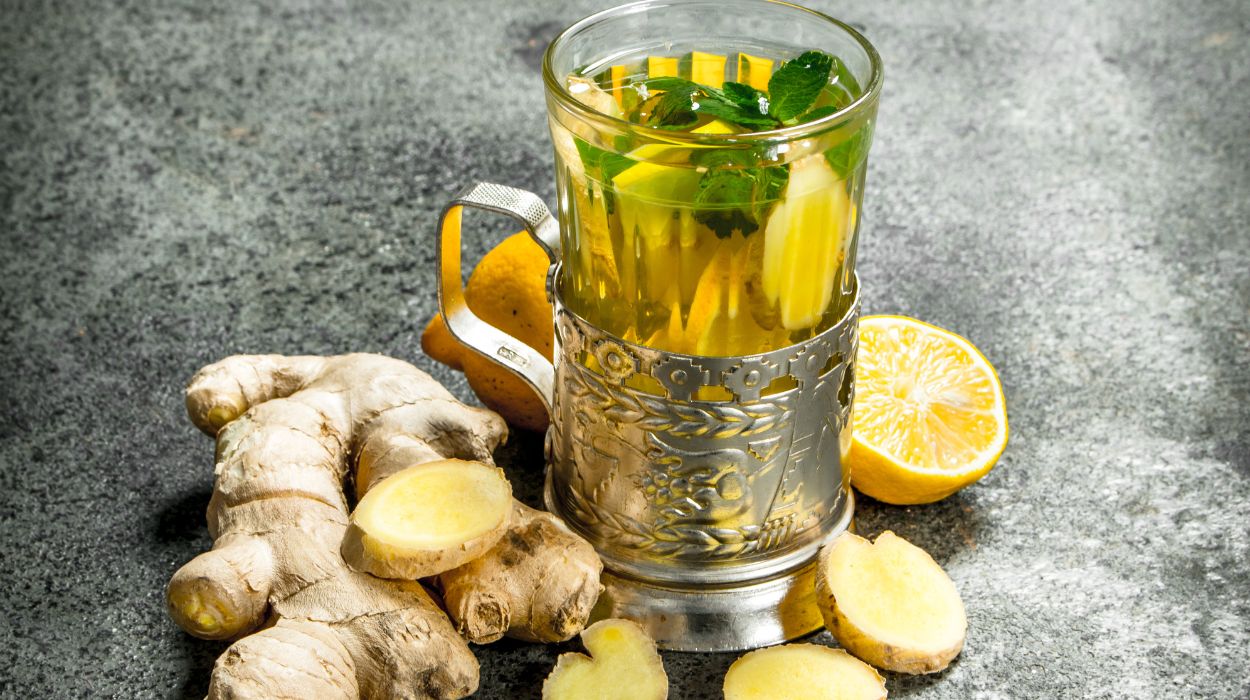 Evidence Based
Evidence Based
Evidence Based
This article is objectively based on relevant scientific literature, written by experienced medical writers, and fact-checked by a team of degreed medical experts.
Our team of registered dietitian nutritionists and licensed medical professionals seek to remain objective and unbiased while preserving the integrity of any scientific debate.
The articles contain evidence-based references from approved scientific sites. The numbers* in parentheses (*1,2,3) will take you to clickable links to our reputable sources.
Is Ginger Ale Good For You 2024? Types, Health Benefits & Side Effects

Ginger ale soda is a simple beverage, and it also alleviates nausea. A 12-ounce can of ginger ale has 32 grams of sugar in it. The American Heart Association (AHA) recommends no more than 24 grams of sugar per day for women and 36 grams per day for men.
Canada dry ginger ale is no better in sugar content. But given the fact that ginger ale alleviates nausea, is such a small benefit worth noting? What about side effects?
This article addresses ginger ale, the types, benefits, and potential side effects. That way, you can take soda with ginger flavor, knowing more about it.
Is Ginger Ale A Healthy Drink?
No. While ginger itself offers health benefits like aiding digestion and reducing nausea, ginger ale often contains high amounts of sugar and lacks significant ginger content. Commercial ginger ale is typically carbonated and may contain artificial flavors and colors. Excessive consumption of sugary drinks like ginger ale can contribute to weight gain, dental issues, and increased risk of chronic diseases like diabetes and heart disease. Opting for homemade ginger tea or unsweetened ginger beverages is a healthier choice to reap the benefits of ginger without the drawbacks of added sugars.
Is Ginger Ale Good For You?
Understanding what you eat and drink is quite essential. In this day and age, it’s necessary to have more information about what you consume. It’s quite easy to find out the benefits of ginger.
Sodas[1] are sugary drinks that bring more harm than good. It’s better to go for healthier options than risk the side effects of too much added sugar in the body. But is it okay to consume ginger ale or better to find a healthier alternative?
Unfortunately, ginger ale does fall into the category of sodas that have too much sugar[2] in them. Manufacturers make it so that you can consume ginger ale on its own. But, it’s also good when you mix it with other drinks.
Manufacturers produce ginger ale by mixing natural or artificial ginger flavoring, carbonated water, and added sugar. Some also opt to use high fructose corn syrup to make it sweeter. These aren’t natural ingredients except for ginger[3].
In addition, there are preservatives in the drink to make it last longer on the shelves or in your home. Manufacturers add flavors like caramel together with sodium benzoate and citric acid. But, it’s not possible to have the full list of ingredients since most manufacturers refuse to give them out.
Ginger ale has been around for quite some time. There are more traditional fermented ginger ale options without additives that you can try. In such a drink, you can enjoy the health benefits of ginger without having to worry about all the additives in regular ginger ale.
Certain communities have been making homemade ginger ale for centuries. Many do so because they understand the many ginger ale health benefits. Homemade ginger ale isn’t like the sugary drinks found in stores as it’s stronger. It requires some ginger extract to make, among other natural ingredients.
Many people see this as a healthier ginger ale since there’s no added sugar or artificial flavorings in it. It has a spicier ginger flavor that takes some time to get accustomed to. But it’s so much better than sugar-sweetened soft drinks.
You need fresh ginger root or powdered ginger to make the homemade ginger ale. In addition, get some cane sugar and water. Avoid adding any high fructose corn syrup or sodium benzoate.
Once the drink is ready, prepare to reap loads of ginger ale benefits. The same might not be true when you opt to take regular ginger ale.
Types Of Ginger Ale

Ginger ale is quite a popular drink. It’s worth noting that it comes in several types of ginger ale, including:
Regular
Regular ginger ale is a broad term that you can use to describe commercial soft drinks and traditional drinks. Both contain varying amounts of fresh ginger root but differ in terms of other ingredients. Most commercial ginger ale manufacturers use high fructose corn syrup, carbonated water, flavorings, and preservatives.
But, the traditional one is a healthier ginger ale fit for consumption. You can enjoy all the benefits of ginger without worrying about additives.
Diet
A diet ginger ale simply means it doesn’t contain any added sugar. Unlike the other sugary drinks, manufacturers opt to use artificial sweeteners in this ginger ale.
Still, the ginger ale contains ginger flavor and carbonated water that makes soft drinks.
Dry
Dry ginger ale is a manufacturers’ marketing tactic to sell a spicier drink. This spicier option requires sourcing the ginger root in a specific way to make a ‘drier’ version of commercial ginger ales.
Some even opt to use more artificial ginger flavors to add more spice to the drink. The drier ginger flavor has a stronger ginger taste and can alleviate morning sickness.
These are the three types of ginger ale. You can take them to reap the important health benefits of ginger. But, the type you like depends on your tastes and preferences.
Health Benefits Of Ginger Ale

Ginger ale is a simple drink. It’s not a type of healthy drink, but it does have health benefits worth noting. Some people see it as a better form of ginger supplementation.
Ginger has been around for quite some time and has amazing benefits[4].
Find Relief From Nausea
People who experience nausea and morning sickness find it hard to keep anything down. Nausea isn’t only an indicator of morning sickness. It can also be a symptom of an upset stomach, chemotherapy, or migraines.
Drinking commercial ginger ales may help you feel much better[5]. This tends to work because of the compounds in the fresh ginger[6]. They include shogaols and gingerols readily available in fresh ginger.
May Improve Heart Health
One symptom of poor heart health[7] is high blood pressure, which is a precursor to cardiovascular disease.
Ginger ale may improve heart health as it helps lower blood pressure.
Caffeine-Free Drink
Other soft drinks have caffeine as a common ingredient. But ginger ale doesn’t have caffeine which makes it a better option.
Instead, manufacturers use ginger extract to make a caffeine-free carbonated beverage.
May Reduce Inflammation
Ginger ale may have anti-inflammatory effects thanks to the natural ginger. It benefits[8] your joints[9] and brain. Ginger ale can help relieve stiff joints and improve mobility.
May Result In Antioxidant Effects
Ginger contains ginger oil which is a great source of antioxidants. The antioxidant content in ginger ale can benefit your body[10].
But, this might diminish in a highly-processed carbonated beverage.
May Help Alleviate Migraines
Ginger powder extract is quite effective when it comes to acute migraine treatment, according to a study[11] that showed it’s more effective than taking prescribed medication. In another study[12], patients found relief from migraines after placing ginger powder underneath the tongue.
Ginger Vs. Ginger Ale
As indicated above, ginger carries many health benefits. It’s also worth noting that ginger ale isn’t a healthy drink. This is a type of carbonated beverage containing ingredients such as nonnutritive sweeteners like added sugar or high fructose syrups. These artificial sweeteners have no benefit to the body.
Since ginger ale contains only one or a few natural ingredients, it’s best only to consume a little at a time. The added sugar, carbonated water, and nonnutritive sweeteners do more harm than good.
Potential Side-Effects Of Ginger Ale
It’s better not to consume too much ginger ale.
Some possible side effects you might encounter when you take ginger ale consistently include:
Increased Gassiness And Bloating
Drinks with carbonated water tend to make you gassier and more bloated. You might encounter gassiness and bloating when you take ginger ale.
In addition, there are more consumed nonnutritive sweeteners in diet ginger ale. When you consume large amounts of nonnutritive sweeteners, you can experience bloating[13].
Added Sugar
Ginger ale isn’t a healthy drink, and the primary reason is high amounts of added sugar. Research shows that consuming too much sugar can harm your health. The sugar or high fructose content leads to weight gain, among other side effects.
Weight gain can be a precursor[14] to other chronic diseases like high blood pressure. Apart from that, you can also encounter dental cavities due to the high sugar content.
Nonnutritive Sweeteners
Diet ginger ale contains nonnutritive sweeteners that can negatively affect your metabolism.
For instance, taking too much of the drink can diminish the level of beneficial bacteria in your intestinal tract. Such occurrences can cause obesity or type 2 diabetes.
How To Choose Suitable Ginger Ale
There are 3 types of ginger ale, and it’s important to pick the right one for you. Always check the ingredients of the drink as you select the best one. Still, it’s worth noting that all ginger ale at the store contains nonnutritive sweeteners, natural or artificial ginger, and carbonated water.
All these ingredients can lead to weight gain and other side effects listed above. You can drink it plain or mix it with other drinks like apple cider vinegar or lemon juice. When you add lemon juice to ginger ale, you end up with a refreshing drink. Some people even make ginger tea with ginger ale.
Ginger ale made at home tends to have more healthy ingredients. It’s better to consume it with sparkling water, which is a better option. You can mix it with spirit-based drinks like vodka or Rum. You can even use it to make sourdough bread.
Conclusion
Ginger ale is a type of soft drink that you can buy from the store. Many people like it because it contains ginger. The drink has been around for centuries, but today’s commercial version contains lots of added sugar.
Natural ginger has many health benefits, including anti-inflammatory, antioxidant, and better heart health, among others. It can also help relieve nausea from morning sickness, stomach upset, or other ailments.
But, it’s worth noting that the ginger in the drink is responsible for the benefits. Ginger ale in itself isn’t a healthy drink, so consume it in low amounts.
+ 14 sources
Health Canal avoids using tertiary references. We have strict sourcing guidelines and rely on peer-reviewed studies, academic researches from medical associations and institutions. To ensure the accuracy of articles in Health Canal, you can read more about the editorial process here
- Vartanian, L.R., Schwartz, M.B. and Brownell, K.D. (2007). Effects of Soft Drink Consumption on Nutrition and Health: A Systematic Review and Meta-Analysis. American Journal of Public Health, [online] 97(4), pp.667–675. Available at: https://www.ncbi.nlm.nih.gov/labs/pmc/articles/PMC1829363/Is Ginger Ale Good For You? Types, Health Benefits & Side Effects
- Rippe, J. and Angelopoulos, T. (2016). Relationship between Added Sugars Consumption and Chronic Disease Risk Factors: Current Understanding. Nutrients, [online] 8(11), p.697. Available at: https://www.ncbi.nlm.nih.gov/labs/pmc/articles/PMC5133084/Is Ginger Ale Good For You? Types, Health Benefits & Side Effects
- Anh, N.H., Kim, S.J., Long, N.P., Min, J.E., Yoon, Y.C., Lee, E.G., Kim, M., Kim, T.J., Yang, Y.Y., Son, E.Y., Yoon, S.J., Diem, N.C., Kim, H.M. and Kwon, S.W. (2020). Ginger on Human Health: A Comprehensive Systematic Review of 109 Randomized Controlled Trials. Nutrients, [online] 12(1), p.157. Available at: https://www.ncbi.nlm.nih.gov/labs/pmc/articles/PMC7019938/Is Ginger Ale Good For You? Types, Health Benefits & Side Effects
- Bode, A.M. and Dong, Z. (2022). The Amazing and Mighty Ginger. [online] Nih.gov. Available at: https://www.ncbi.nlm.nih.gov/books/NBK92775/Is Ginger Ale Good For You? Types, Health Benefits & Side Effects
- Lete, I. and Alluέ, J. (2016). The Effectiveness of Ginger in the Prevention of Nausea and Vomiting during Pregnancy and Chemotherapy. Integrative Medicine Insights, [online] 11, p.IMI.S36273. Available at: https://www.ncbi.nlm.nih.gov/labs/pmc/articles/PMC4818021/ Is Ginger Ale Good For You? Types, Health Benefits & Side Effects
- Ryan, J.L., Heckler, C.E., Roscoe, J.A., Dakhil, S.R., Kirshner, J., Flynn, P.J., Hickok, J.T. and Morrow, G.R. (2011). Ginger (Zingiber officinale) reduces acute chemotherapy-induced nausea: a URCC CCOP study of 576 patients. Supportive Care in Cancer, [online] 20(7), pp.1479–1489. Available at: https://pubmed.ncbi.nlm.nih.gov/21818642/ Is Ginger Ale Good For You? Types, Health Benefits & Side Effects
- Hasani, H., Arab, A., Hadi, A., Pourmasoumi, M., Ghavami, A. and Miraghajani, M. (2019). Does ginger supplementation lower blood pressure? A systematic review and meta‐analysis of clinical trials. Phytotherapy Research, [online] 33(6), pp.1639–1647. Available at: https://pubmed.ncbi.nlm.nih.gov/30972845/ Is Ginger Ale Good For You? Types, Health Benefits & Side Effects
- Ho, S.-C., Chang, K.-S. and Lin, C.-C. (2013). Anti-neuroinflammatory capacity of fresh ginger is attributed mainly to 10-gingerol. Food Chemistry, [online] 141(3), pp.3183–3191. Available at: https://pubmed.ncbi.nlm.nih.gov/23871076/ Is Ginger Ale Good For You? Types, Health Benefits & Side Effects
- Altman RD;Marcussen KC (2017). Effects of a ginger extract on knee pain in patients with osteoarthritis. Arthritis and rheumatism, [online] 44(11). Available at: https://pubmed.ncbi.nlm.nih.gov/11710709/Is Ginger Ale Good For You? Types, Health Benefits & Side Effects
- Jeena K;Liju VB;Kuttan R (2013). Antioxidant, anti-inflammatory and antinociceptive activities of essential oil from ginger. Indian journal of physiology and pharmacology, [online] 57(1). Available at: https://pubmed.ncbi.nlm.nih.gov/24020099/Is Ginger Ale Good For You? Types, Health Benefits & Side Effects
- Maghbooli, M., Golipour, F., Moghimi Esfandabadi, A. and Yousefi, M. (2013). Comparison Between the Efficacy of Ginger and Sumatriptan in the Ablative Treatment of the Common Migraine. Phytotherapy Research, [online] 28(3), pp.412–415. Available at: https://pubmed.ncbi.nlm.nih.gov/23657930/Is Ginger Ale Good For You? Types, Health Benefits & Side Effects
- Cady, R.K., Goldstein, J., Nett, R., Mitchell, R., Beach, M.E. and Browning, R. (2011). A Double-Blind Placebo-Controlled Pilot Study of Sublingual Feverfew and Ginger (LipiGesicTMM) in the Treatment of Migraine. Headache: The Journal of Head and Face Pain, [online] 51(7), pp.1078–1086. Available at: https://pubmed.ncbi.nlm.nih.gov/21631494/Is Ginger Ale Good For You? Types, Health Benefits & Side Effects
- Mäkinen, K.K. (2016). Gastrointestinal Disturbances Associated with the Consumption of Sugar Alcohols with Special Consideration of Xylitol: Scientific Review and Instructions for Dentists and Other Health-Care Professionals. International Journal of Dentistry, [online] 2016, pp.1–16. Available at: https://www.ncbi.nlm.nih.gov/labs/pmc/articles/PMC5093271/Is Ginger Ale Good For You? Types, Health Benefits & Side Effects
- Malik, V.S., Pan, A., Willett, W.C. and Hu, F.B. (2013). Sugar-sweetened beverages and weight gain in children and adults: a systematic review and meta-analysis. The American Journal of Clinical Nutrition, [online] 98(4), pp.1084–1102. Available at: https://pubmed.ncbi.nlm.nih.gov/23966427/Is Ginger Ale Good For You? Types, Health Benefits & Side Effects



